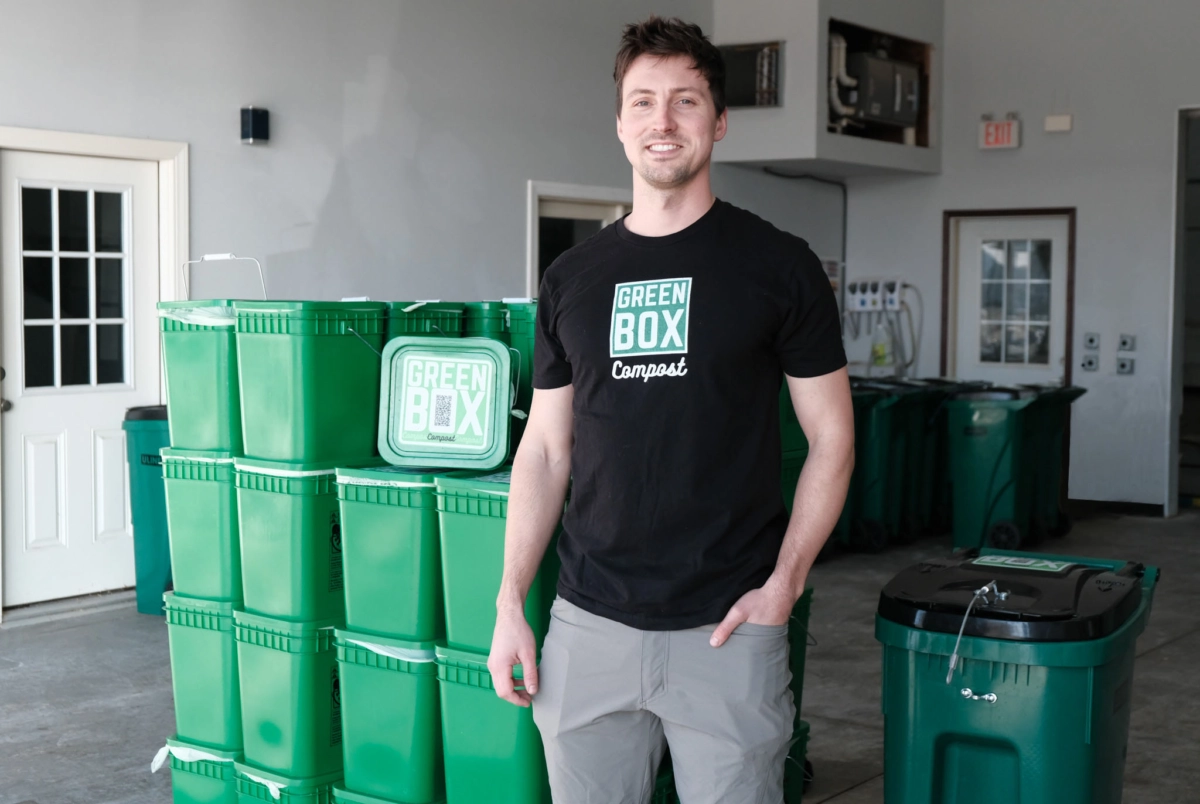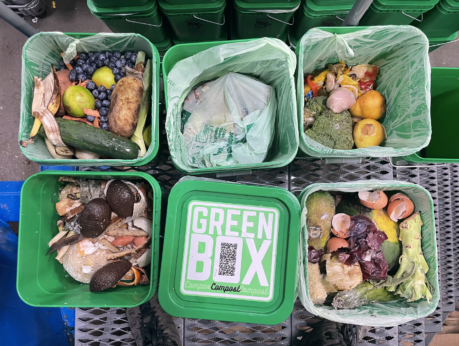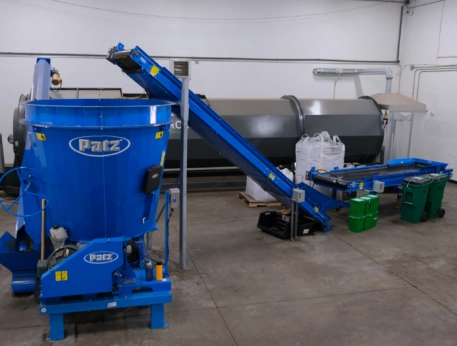“I was in my parents’ basement for about six months, just shopping around municipalities.”

Where there’s a will, there’s not always a way.
Ben Stanger has composted his whole life, starting with a backyard bin when he was a child. But when he wanted to expand his composting efforts and start a business, he had a hard time finding a municipality that would let him.
Eventually, he was able to work with officials in Sun Prairie, Wisconsin, to update their bylaws so Stanger could start composting. Now, two years later, his business Green Box has grown by 28 times, and he’s looking to see how much further he can go.
Stanger spoke with Modern Farmer about what it takes to start composting at this scale and how to advocate to rework restrictive legislation.
This interview has been edited for length and clarity.

Photography submitted by Green Box.
Modern Farmer: First things first: Ben, how did this interest in composting start for you?
Ben Stanger: Growing up, my family was always very involved in growing food, gardening, canning stuff, whatever. As part of that, we composted as a way of doing natural waste diversion and creating quality soil to go back into the garden. It was something I was very used to and, as a young child, always took for granted. I realized, as I was older, “Oh, everybody doesn’t do this. Why don’t they all do this?”
I moved to Chicago after college and, in 2017, I was working at a sustainable seafood company at a farmers market. And I saw a compost collection van driving around the neighborhood. And I just realized, “oh, wow, people are doing this, this is a real thing.” I contacted them, and I started working for them. I worked there for about two years. And in those two years, during the beginning of the pandemic, we grew really quickly. And I realized, “OK, this is a real way to kind of solve this issue.”
MF: So, that’s when you decided to iterate on the Chicago business, but in your hometown of Madison, Wisconsin?
BS: Yeah. In Chicago, [the business] didn’t actually compost ourselves. We were collecting organic waste, and then somebody else collected it from us. And that worked for the situation, but I kind of felt like it didn’t give us enough oversight over what we were doing.
After moving back to Madison, I realized there wasn’t really any infrastructure to compost food scraps, even if I wanted to outsource it and just be a collector, like in Chicago.
MF: On the surface, it seems like a compost program would be easy to implement if a city already has a trash or recycling pick-up. When you were searching for a place to start your business, what were the issues you came up against?
BS: The big thing is a lack of infrastructure; there’s nowhere to compost that amount of food waste. Food waste is hard to compost compared to other organic waste, like yard waste. It’s really nitrogen rich, it’s really putrescible. It’s really wet and often contaminated. And so you have to be able to handle all those things. And so it kind of requires a different approach than yard waste composting, which is pretty easy to manage. And so just making the investments, there are things that communities haven’t done.
MF: In terms of infrastructure, many cities have landfills. What do you need for a large-scale composting program?
BS: Well, there’s no one right way to do this, everything is kind of iterative.
We opted for a rotating drum composter. Our goal was to just get our foot in the door in whatever municipality we ended up working in. And to do that, we wanted to make sure our process was as clean and efficient as possible so that we would allay any fears about possible rodents or pests or bad smells. So, we spent a lot of money to make sure that we didn’t run into any perception issues. Our main goal is to kind of make the perception of composting seem cool and achievable.

Photography submitted by Green Box.
MF: In a place like Wisconsin, roughly a third of household waste is food waste. With that much organic waste, compost seems like an issue many jurisdictions would want to tackle. How many places did you go to before you found a home for Green Box?
BS: I was in my parents’ basement for about six months, just shopping around municipalities. Pretty much every place I emailed either didn’t have a commercial composting zoning classification, or if they did, they expressly prohibited food scrap composting. And pretty much every place, all their zoning codes were written in the ‘80s, when they were more concerned about pests for local landowners and homeowners. That was a big legislative hurdle.
The other hurdle was real estate. The market is really hot right now, there are a lot of people moving here. And a lot of it is dedicated towards either residential or multi-use development, so it’s hard to find space for this sort of operation.
Finally, just being a new business owner in a business that’s not well established, it’s hard convincing people that what you are doing is worthwhile, if people hadn’t even heard of composting.
[RELATED: Map: Who Composts?]
MF: So, you had to contend with a bunch of bylaws written 40 or more years ago.
BS: Yeah. And we did find a home in Sun Prairie. That’s a combination of timing, finding a good location and warehouse and the city being willing to work with us. What ended up happening was there was a zoning code to allow for commercial composting operations. Sun Prairie was very helpful and willing to work with us to update one of the classifications to compost food scraps.
MF: So, now, your coverage area extends outside of Sun Prairie, and you actually have customers throughout Madison as well.
BS: We started off smaller and tried to be dense. We started just about two years ago, on Valentine’s Day, 2022.
At first, we had 25 members that were composting 200 pounds a week. And because of that we had to be fairly tight, just to make sure that we weren’t losing money on pickups. But now that we have about 700 residential members, composting about seven tons a week, we can afford to go a little bit further afield. In fact, we’re planning a few expansions to even further surrounding smaller municipalities in this coming year.

Photography submitted by Green Box.
MF: Is composting easier with more people, with larger pickups? Can you do things that backyard composters can’t?
BS: So, in order to kill pathogens like E. coli and salmonella in compost, you need to achieve a temperature of 131 degrees [Fahrenheit] for a sustained 72 hours. That’s the baseline. Most backyard composting piles don’t hit that, so you don’t want to compost meat, bones or dairy in those smaller compost piles because of the risk of bacteria spreading.
But for us, we can achieve those temperatures on an industrial scale, no problem. And because we are rotating and composting in a vessel indoors, we have no issues with pests.
We need to make this easy for the average consumer to adopt. We’re happy to take diehard conservationists and environmentalists, that’s great. But we figured they were probably already composting. We need to try and cater to people who don’t have the time or the interest or just the knowledge. So, [we’re] trying to get as broad a base as possible.
[RELATED: Composting Makes Sense. Why Don’t More Cities Do It?]
MF: That’s an interesting goal, to go after the customers who might not be your immediate target audience. I know that, for many folks, efforts like composting can seem a little futile in the face of the massive changes that need to happen to help our planet.
BS: Definitely. I’ll say it probably doesn’t matter that much if one individual composts. But if that one individual composting gets 10 more people to compost, eventually those 10 get 10 more, and then we get to the point where now there’s buy-in and capital investment in the infrastructure, so we can start working with whole municipalities…That’s a real impact. Part of this is changing perceptions, changing goals, changing understandings about how waste works. That’s the really powerful part.

Photography submitted by Green Box.
For more on what is takes for cities to start a compost program, check out our feature on municipal compost programs here.
Ready to compost where you live? Here are some expert tips to get started.
- Look for community compost groups. Many organizations, including community gardens or environmental clubs, hold seminars or introductory panels on how to start composting. Get up to speed on what’s offered in your area; in addition to learning the composting basics, you might be able to join a network that’s already established. You can also search for a local composter here, or use this EPA map to find opportunities to divert excess food near you.
- Check in with your city’s waste management team. Does your city offer composting? If they do, is it easily accessible? Most city’s waste management departments are easily found on the city website. From there, they should lay out exactly what you can and can’t compost, your individual pickup times, or the drop-off locations nearest you.
- Make your voice heard. If your city does not offer a compost program, let the waste management department know you want one! One of the biggest hurdles to starting a pilot program is ensuring that there are enough residents interested in composting in the first place. Make it clear that you want to participate in a program, which makes it much easier for city officials to greenlight one. There are also resources to help municipalities as they get started, including this template from the US Composting Council which helps cities look at land use ordinances and classifications.
- Look at the zoning bylaws. As Ben found out, some municipal bylaws were written decades ago, and they may not be up to date with the best waste management strategies for cities. But when city officials see that there is interest from the public, they have more reason to look at updating those bylaws, or looking at new ways of waste diversion.
***
We feel your pain Ben. Here’s a resource for future use. https://www.compostingcouncil.org/page/Zoning?&hhsearchterms=%22zoning%22